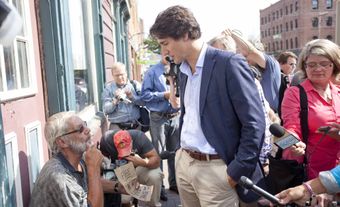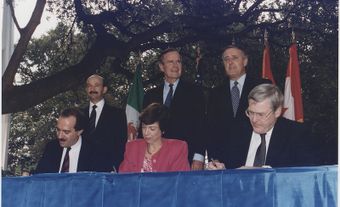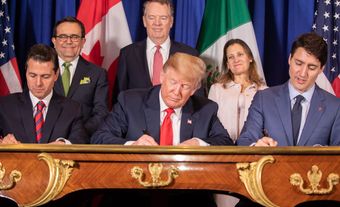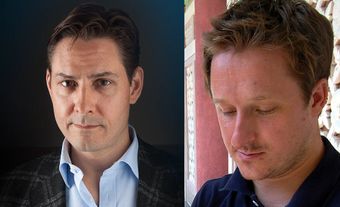Christina Alexandra “Chrystia” Freeland, politician, journalist, editor and writer, Deputy Prime Minister of Canada, 2019–present (born 2 August 1968 in Peace River, Alberta). Chrystia Freeland is the Liberal member of Parliament (MP) for University-Rosedale. She currently serves as Deputy Prime Minister and Minister of Finance. She is the first woman in Canada to hold the latter role. She has also served as Minister of Intergovernmental Affairs, Minister of Foreign Affairs and Minister of International Trade. Notably, she handled the negotiation of the Canada-United States-Mexico Agreement (CUSMA), as well as difficult diplomatic situations with Ukraine, Russia, Saudi Arabia and China. Freeland is also an award-winning journalist, editor and author of such books as Plutocrats: The Rise of the New Global Super Rich and the Fall of Everyone Else (2012).

Early Life and Family
Chrystia Freeland was born in Peace River, Alberta, to Donald Freeland, a lawyer and farmer, and Halyna (née Chomiak) Freeland. Gerald Baldwin, a great-uncle on her father’s side, was a Progressive Conservative MP. He was credited as the “father and grandfather” of the Access to Information Act.
Chrystia Freeland’s maternal grandparents fled Ukraine after the 1939 German-Soviet Nonaggression Pact. Her mother, Halyna, was born in a US Army-run refugee camp in Germany. Halyna Freeland ran for Parliament under the New Democratic Party (NDP) banner in Edmonton-Strathcona in 1988. She also ran a feminist socialist co-operative called Hromada.
Chrystia Freeland has expressed great pride in her Ukrainian heritage. She speaks fluent Ukrainian, in addition to English, French, Russian and Italian. In her maiden speech in the House of Commons on 27 January 2014, she noted, “My mother was born in a refugee camp. Her parents, together with her and her three sisters, were grateful and delighted to find refuge here in Canada, like so many other Ukrainian Canadians.”
Education
Chrystia Freeland attended T.A. Norris Middle School in Peace River and Old Scona Academic High School in Edmonton, Alberta. She was awarded a scholarship to attend United World College of the Adriatic in Italy from 1984 to 1986. She studied Russian history and literature at Harvard University. Her studies included an exchange in Kyiv just before the fall of the Berlin Wall. In 1993, as a Rhodes Scholar, Freeland obtained a master’s degree in Slavonic Studies from St Antony’s College at the University of Oxford.
Journalist and Author
Chrystia Freeland’s first experience in journalism was as a Ukraine-based freelance journalist. She worked for the Financial Times, the Economist and the Washington Post. She eventually served as an Eastern European correspondent for the Financial Times and headed its Moscow bureau. She was deputy editor of the Globe and Mail from 1999 to 2001. She then returned to the Financial Times as deputy editor and US managing editor. In 2010, she moved to Thomson Reuters as managing director and editor of consumer news.
Freeland published her first book, Sale of the Century: Russia’s Wild Ride from Communism to Capitalism, in 2000. The book details the conflict between oligarchs and young reformers in Russia’s post-communist economy. In 2012, she published Plutocrats: The Rise of the New Global Super Rich and the Fall of Everyone Else. It was widely praised. The book won the 2013 Lionel Gelber Prize and the National Business Book Award. The Guardian called it a “very necessary book.” The National Post declared it “a clear-eyed account of the social and political implications of a class of super-rich who hold an increasing portion of global wealth.” In 2013, Freeland gave a widely viewed TED Talk on global income inequality.
Election to Parliament
Chrystia Freeland met Liberal Party leader Justin Trudeau at a book signing in 2013. After Bob Rae resigned his Toronto Centre seat that June, Trudeau’s team convinced Freeland to run for the Liberals in the following by-election. Though reluctant at first, Freeland was convinced to run by the idea of serving the country. “In all of our conversations, the idea of public service was very important to [Trudeau],” she said. “And it is to me, too.”
In the federal by-election on 25 November 2013, Freeland faced NDP candidate and journalist Linda McQuaig. Freeland won with 17,194 votes (49.4 per cent) to McQuaig’s 12,640 votes (36.3 per cent).
The riding boundaries were later redrawn. Freeland stood for re-election in the new riding of University-Rosedale in the 2015 federal election. Freeland defeated NDP candidate Jennifer Hollett by more than 11,000 votes, taking 49.8 per cent of the vote.

Minister of Foreign Trade
After the 2015 election, Chrystia Freeland was appointed to Cabinet as Minister of International Trade. Around the same time, she was named one of Toronto’s 50 most influential people by Toronto Life.
In 2016, Freeland was involved in negotiations for the Comprehensive Economic and Trade Agreement (CETA) between Canada and the European Union. “Canada intends to be a leader on the principles that guide international investment in the 21st century, and I will be looking to collaborate further with like-minded partners in the days ahead,” she declared.
The European deal almost collapsed due to opposition from the Belgian region of Wallonia. After extensive negotiations, Freeland walked out of the meetings. “We have decided to return home,” she declared. “I am very sad. It is emotional for me.” Despite this, Freeland and Trudeau were able to broker a deal.
In February 2016, Freeland signed Canada to the Trans-Pacific Partnership. However, the agreement became defunct when the United States, under President Donald Trump, withdrew its signature.
Renegotiating NAFTA
In early 2017, the Liberal cabinet was shuffled. This was likely in response to the election of the Trump administration in the US. Freeland was promoted to Minister of Foreign Affairs but retained the Canada-US trade portfolio. It included renegotiating the North American Free Trade Agreement (NAFTA).
Negotiations with a mercurial new US administration were tense. “This is the most protectionist US administration since the 1930s,” Freeland told one journalist. In response, she formed a bipartisan advisory council that included Conservative politicians.
The US introduced various “poison pill” demands that neither Canada nor Mexico would agree to. Canada, meanwhile, sought exemptions to tariffs on some items, such as steel. The protracted negotiations raised Freeland’s profile internationally. A Maclean’s article noted that she “began to gain a fan base” among lawyers and academics who focus on Canadian trade policy. Negotiations on tariffs and the auto industry were particularly fraught. The US and Canada traded retaliatory tariffs on items such as cars, whisky and ketchup.
On 27 August 2017, US President Donald Trump declared that the US and Mexico were cutting Canada out, which caused some panic. Despite this, Freeland and US negotiator Robert Lighthizer were able to finalize a deal by the 30 September deadline. The agreement, called the Canada-United States-Mexico Agreement (CUSMA), contains new provisions regarding intellectual copyright. It also opened Canada’s dairy market to US producers.
Freeland won much respect from Lighthizer, who told the Washington Post, “She did an amazing job for Canada.”
In May 2019, Freeland renewed pressure on the US to remove the tariffs on Canadian steel and aluminum. On 17 May, the American government agreed to end the tariffs, while Canada in turn lifted its own countermeasures.
.jpg)
Foreign Affairs: Ukraine and Russia
Before Chrystia Freeland joined Cabinet, she had expressed criticism of Ukrainian president Viktor Yanukovych, who many viewed as a Russian pawn. She also criticized Russian military involvement in Ukraine and Crimea. In 2014, she wrote in a Globe and Mail article that “Canada should impose personal sanctions against Yanukovych and his political backers and freeze their assets.” After Canada imposed economic sanctions and travel bans on Ukrainian and Russian officials, the Russian government retaliated with sanctions on 13 Canadians, including Freeland.
In 2017, Freeland spearheaded the Justice for Victims of Corrupt Foreign Officials Act. It authorizes the government to impose asset freezes and travel bans on those who abuse human rights and are involved in corruption. This legislation was viewed as a direct response to suspected Russian activity, including the 2006 and 2015 murders of Alexander Litvinenko and Boris Nemtsov, respectively.
Also in 2017, stories appeared in the media claiming that Freeland’s maternal grandfather, Michael Chomiak, had edited an anti-semitic, Nazi propaganda newspaper in Poland and Austria during the Second World War. Freeland argued that this was an attempt by the Russian government to discredit her. Her office denied that Chomiak had been a Nazi collaborator. However, reporting by the Globe and Mail and the Ottawa Citizen revealed that the allegations were in fact true. They also pointed out that Freeland had known about this for over two decades and had acknowledged it in a scholarly paper she helped edit in 1996.
Meanwhile, tensions with Russia rose further in March 2018, when Canada — among other countries — expelled Russian diplomats after the poisoning of a former spy in the United Kingdom.
.jpg)
Foreign Affairs: China, Saudi Arabia and Venezuela
In September 2017, Chrystia Freeland became the first Western leader to declare the oppression of Rohingya Muslims in Myanmar to be genocide. She referred to the situation as an “ethnic cleansing.” In July 2018, Freeland worked with the United Kingdom and Germany to extract and resettle some of Syria’s White Helmets, whom she referred to as “courageous volunteers.” In contrast, Freeland and the Liberal government were criticized for not showing more support for the Uighur minority in Xinjiang in northwestern China. The Chinese government has been accused of oppressing Uighur activists, including Chinese Canadian citizen Huseyin Celil. He has been in Chinese custody since 2006 and has not been heard from since 2016.
Canadian relations with China began to deteriorate in late 2018. On 1 December 2018, Canadian officials arrested Huawei executive Meng Wanzhou, at the request of the US government. Freeland defended the decision, stating that it was “in keeping with our international obligations.” The case led to the arrest and detention of two Canadians in China and a protracted diplomatic conflict between the two countries. (See Meng Wanzhou Affair.)
Relations with Saudi Arabia also became strained around this time. On 2 August 2018, Freeland called for the release of imprisoned Saudi blogger Raif Badawi and his family on Twitter. This led the Saudi government to suspend diplomatic ties and halt trade agreements. After the October 2018 killing of Saudi journalist Jamal Khashoggi, Freeland condemned the probable involvement of members of the Saudi government in the murder. In November, she announced sanctions against 17 Saudi citizens who were suspected of being linked to the killing. In January 2019, Freeland made an appearance in Toronto to welcome Saudi teen Rahaf Mohammed Alqunun. Canada had granted her refugee status after she fled an allegedly abusive situation in her home country.
In 2018 and 2019, Freeland also took a strong stance against Nicolás Maduro’s socialist government in Venezuela by endorsing opponent Juan Guaidó and imposing sanctions. This stance was criticized by some observers as geopolitical meddling.
Federal Election 2019
In October 2019, Chrystia Freeland was re-elected as Liberal MP for Toronto’s University-Rosedale riding, winning more than half of the vote. However, the Liberal Party itself lost support and won 157 seats in total, resulting in a minority government. In November 2019, Freeland was appointed Deputy Prime Minister and Minister of Intergovernmental Affairs.
Minister of Finance
On 18 August 2020, after the resignation of Bill Morneau following the WE Charity scandal, Freeland was appointed Minister of Finance. She became the first woman to hold the position in Canada.
Freeland’s first budget, announced on 19 April 2021, was hailed as one of the most ambitious in several years. Its central objectives were to end the COVID-19 pandemic through mass vaccination and to end the pandemic-induced recession. To contend with the short-term economic problems related to the pandemic, the budget extended the Canada Emergency Wage Subsidy, the Canada Emergency Rent Subsidy, and the Lockdown Support programs until the fall of 2021.
The budget’s notable long-term policy changes included a long-awaited federal childcare program. It aimed to lower the cost of childcare across Canada to an average of $10 a day by 2025–26. It included a raise in the federal minimum wage to $15. The budget also enhanced the Canada Workers Benefit — a tax credit designed to help low-income families — and pledged a significant increase in investment and social services for Indigenous communities across Canada.
The following year, Freeland’s office introduced a budget for 2022 that focused on lowering the cost of living for Canadians. Measures included the Canada Dental Benefit program and new federal supports for mental health care. In response to the rapid rise in housing costs during the COVID-19 pandemic, the budget also introduced several policies intended to improve housing affordability. These included the expansion of the federal tax credit for first-time home buyers (raising it to a maximum $1,500) and the creation of the Housing Accelerator Fund, which aimed to boost Canada’s housing stock by 100,000 units over five years.
The government indicated that its National Housing Strategy was on track to deliver over $72 billion in financial support by 2027–28. Critics, however, observed that much of this money would be offered in the form of loans. By September 2021, the National Housing Strategy had delivered only $363 million in grants and contributed to the construction of around 17,500 affordable units.
The 2023 budget brought forward by Freeland’s office focused largely on the expansion of existing programs, such as encouraging investments toward a clean economy and to improve affordability.
Response to 2022 “Freedom Convoy” Protest
Beginning in late January 2022, a trucker convoy protesting the federal government’s vaccine mandate occupied downtown Ottawa. Convoy supporters soon blocked border crossings at Windsor, Ontario, and Coutts, Alberta. In response, the municipal and provincial governments declared a state of emergency. On 14 February, the federal government invoked the Emergencies Act. Within days, armoured police had cleared the protest encampment in Ottawa.
Freeland took a leading role in the federal government’s response. She announced that the Act allowed the government to freeze the accounts and online fundraisers associated with the convoy. The invocation of the Act was widely criticized by conservative politicians, including the premiers of Alberta and Saskatchewan, who threatened legal challenges against the Trudeau government. Nine months later, Freeland defended the government’s actions to the Public Order Emergency Commission. She said, “I would have preferred not to have had to do this. But in my mind, I weigh that against what I really believe is the tens, hundreds of thousands of Canadian jobs and families that we protected.”
Response to War in Ukraine
Following Russia’s invasion of Ukraine in February 2022, Canada strengthened its ties to Ukraine’s government by providing armaments, money and some personnel. Freeland was at the forefront of these diplomatic efforts, coordinating sanctions against Russia and publicly calling for Russia’s expulsion from the G20 and the IMF.
Personal Life
Chrystia Freeland met her partner, New York Times investigative reporter Graham Bowley, while working at the Financial Times. They have three children, Natalka, Halyna and Ivan, and live in Freeland’s riding in Toronto.
Honours and Awards
- Lionel Gelber Prize (Plutocrats: The Rise of the New Global Super-Rich and the Fall of Everyone Else), Munk School of Global Affairs and Public Policy (2013)
- National Business Book Award (Plutocrats: The Rise of the New Global Super-Rich and the Fall of Everyone Else) (2013)
- Eric M. Warburg Award, Atlantik-Brücke (2018)
- Diplomat of the Year, Foreign Policy (2018)
- Mark Palmer Prize, Freedom House (2020)

 Share on Facebook
Share on Facebook Share on X
Share on X Share by Email
Share by Email Share on Google Classroom
Share on Google Classroom

.jpg)



